Careful catering by producers, chefs and suppliers
This is a special feature from PAX International's 2022 WTCE Hamburg edition, on page 34.
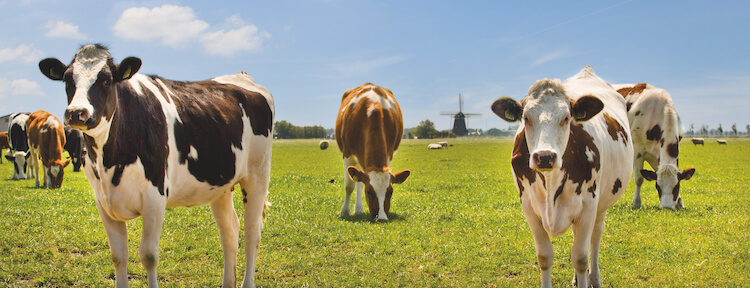
Cows on Beemster’s farm in North Holland
Sustainability – it’s not just for fun anymore! Airlines, suppliers and producers are working toward sustainable production and food service processes to help shrink waste and lessen environmental impact. For some, these options look like adopting modern farming techniques, environmentally-conscious cooking facilities, being prepared for special meal requests and recyclable products for collecting catering waste.
Caring dairy
Tucked into the countryside in North Holland is a group of brown and black patchy cows, part of a co-operative of around 400 family farms, gleefully grazing on grass with no concept that they are producers of one of the world’s most iconic cheese brands.
Sharing details of these 1,900-pound partners is part of Beemster’s steps to addressing sustainability at the source – on the farm.
Patrick Den Drijver, Sales Manager Airlines at Beemster, tells PAX International, the company started its Meadow Program in 2002, highlighting its free-grazing, grass-fed cows. It graduated to its joint-venture Caring Dairy Program with ice cream customer Ben & Jerry’s in 2008, with a focus on animal welfare, climate and biodiversity. And in 2019, Beemster bolstered its commitment to sustainability with its Caring Dairy 2.0 Program, centering on cows, feed and environment.
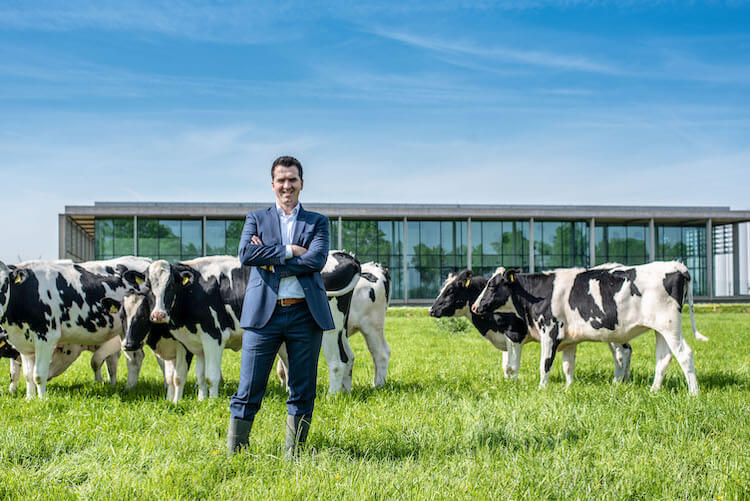
Patrick Den Drijver, Sales Manager Airlines at Beemster, on a Beemster farm in the Netherlands
As part of the Caring Dairy 2.0 Program, every cow gets her own space with no overcrowding on the farms. There are massage brushes throughout the barns for cows to rub on, and soft beds and floors for comfortability and fewer injuries. Cows are put out to meadow for maximum time, helping young cattle learn herd behavior and reducing the amount of methane excreted. The farmers use no artificial growth hormones, as few anti-biotics as possible and aims to raise cows to an old age to then make use of the meat they provide.
For feed, the cows are given more grass than silage (corn, legumes and grasses harvested and chopped together). Increasing the ratio of grass to silage helps decrease methane emissions and encourages grassland growth and harvest, explains Den Drijver, adding that the farms have at least 60 percent acreage is permanent grassland.
Permanent grassland locks more carbon into the soil and lessens the reliance on transporting grass between farms. Silage is commonly produced by the farmer itself, or in the region, and the ingredients for fodder (food) are mostly imported from areas close to the Netherlands, Den Drijver says. Using their own silage brings the farms overall carbon footprint down. And implemented this year in the Caring Dairy 2.0 Program, Beemster only uses non-GMO feed, he adds.
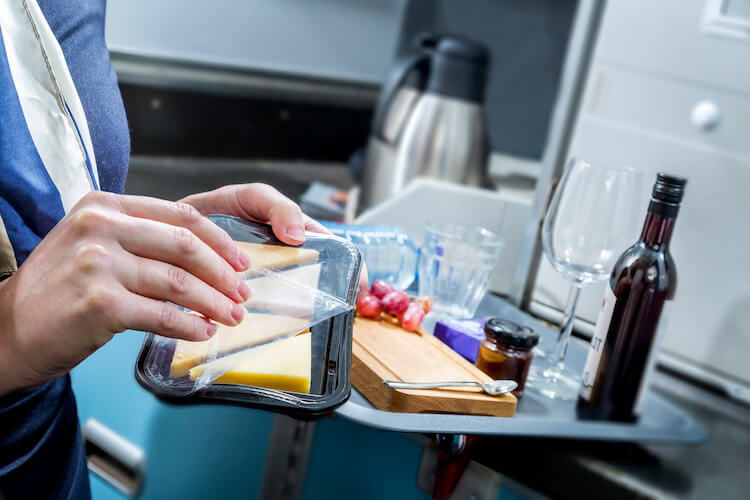
Beemster’s award-winning cheese inflight
For its focus on the environment, Beemster operates on electricity generated by solar panels and wind turbines on the farms. Some farms have installed manure digesters that produce electricity and heat from methane. The heat surplus is used to warm the barns and houses. This technique helps scale back methane emissions and ammonia. The Caring Dairy 2.0 Program has cut back the use of fertilizer on farms and has completely banned the pesticide ‘Round-Up,’ says Den Drijver.
The company uses liquefied natural gas for milk transportation and is working toward testing fully electric milk trucks. And many farms have a bee corridor with wildflowers and native plants to help with diversity in nature.
Beemster is the first Dutch dairy producer to have a climate neutral certified factory. The aim is to have climate positive cheese by 2030, says Den Drijver. Climate positive requires significant reduction in the release of CO2 as well as drawing CO2 from the atmosphere.
Consistency and low emissions output
Sous vide expert Chef Sean Wheaton, Vice President of Culinary Service at Cuisine Solutions, gave PAX International an insightful reminder about sustainability in an interview in late-May.
“From a purely business standpoint, we are part of the larger hospitality and travel industry, so making sure there are still beautiful places for people to go makes sense,” he says. “From a selfish gastronomic standpoint making sure there are still tomatoes and strawberries that taste like the summer sun is very important.”
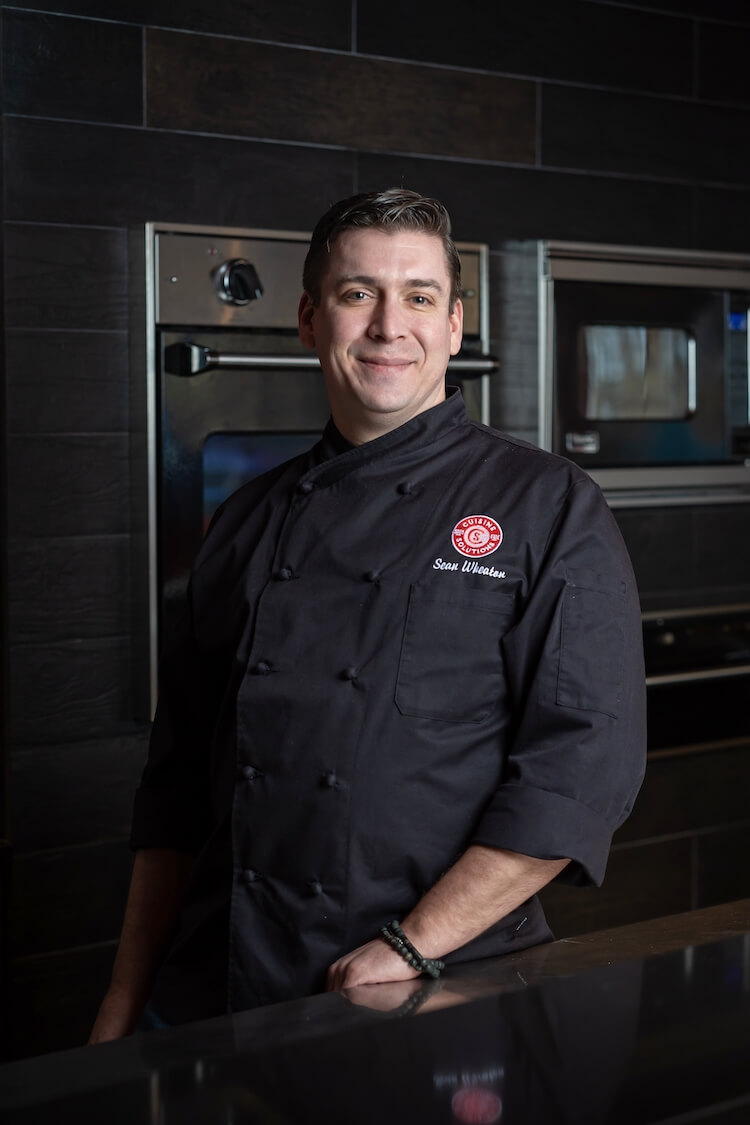
Chef Sean Wheaton, Vice President of Culinary Service at Cuisine Solutions
Cuisine Solutions’ sous vide method guarantees two things: consistency and low emissions output.
Water is the key ingredient. A great conductor of heat, water is circulated and monitored constantly during sous vide cooking. The temperature remains consistent throughout via automated systems, varying only 1 degree at times.
“For comparison, the temperature inside an oven can vary by 50 degrees, air is a very poor conductor of heat,” explains Wheaton.
Products that leave Cuisine Solutions facilities are tested daily by chefs, ensuring all customers receive what they expect. The chefs undergo annual scientific testing for the accuracy of their palates.
Of course, this all ensures consistency in taste, texture, presentation and brand expectation. But it is also a cooking method that naturally translates to lower emissions output versus traditional food processing.
“The entire cooking process is encapsulated in water baths regulated to the time and temperature required for the specific food item. We are not burning gas via traditional cooking techniques, so our footprint is quite low in comparison to others,” says Wheaton.
The water used in the cooking baths is sanitized and reused for future production batches. This reduces potable water consumption by 30 percent, surpassing minimum code requirements.
The company’s processing facility in San Antonio, Texas received LEED certification this spring. The facility hosts the largest community solar installation in San Antonio, has a stormwater management system, a water recycling program, and uses compressed earth blocks that allow for future expansion without disrupting the surrounding environment.
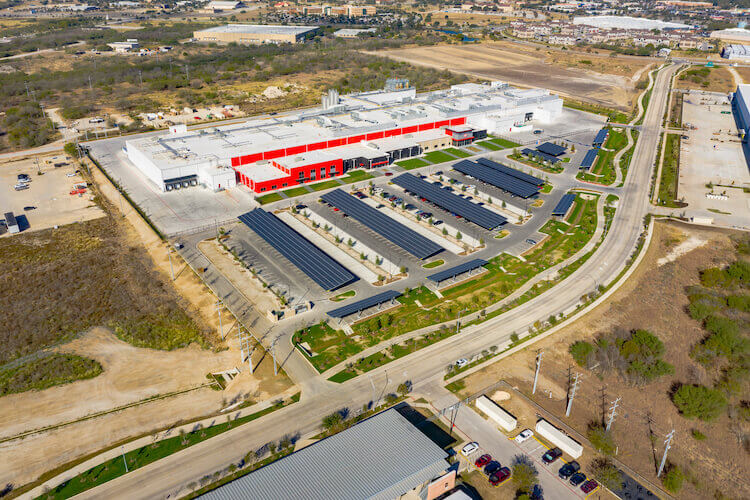
The Cuisine Solutions San Antonio facility
The facility features a 300-space parking lot with electric vehicle (EV) charging stations. Shaded by the solar panels, the spots are available for purchase by San Antonio residents. Users reap the benefits of the panels without having to install them at their homes, including use of the energy and claiming a tax credit for the next 25 years.
Wheaton tells PAX the EV charging stations have cut nearly 1,500 kilograms of greenhouse gas (GHG) emissions and have generated 1,562 megawatt hours of energy to date, saving the users collectively $140,000 on City of San Antonio CPS Energy bills.
The processing facilities are not the only aspect of Cuisine Solutions’ business model focused on sustainability. The company has been offering a range of plant-based products for years, such as fire roasted red pepper sauce, vegan Bolognese and vegan chili.
Cuisine Solutions currently supplies egg snacks for leading brands and recently partnered with JUST on plant-based egg replacement snacks called JUST Omelet Bites. Cuisine Solutions is also working with other partners on plant-based chicken options.
Wheaton says offering plant-based products are important to ensure the company is staying on track with global trends and demands.
“We feel a lot of requests coming down the pipeline. All major players, both in the industry we’re talking about today but also in national restaurant chains and hotels, are wanting to make sure they have plant-based options on their menus. They’re coming to us as global innovators in the food space,” Wheaton says.
Challenge accepted
A one-size-fits-all approach to inflight catering is not effective when there are many different diets onboard. AMI Groups’ Special Meals Program for American Airlines helps ensure passengers with dietetic needs get the meal they need, when they need it.

George Horvat, Vice President of Innovative Solutions at AMI Group
American tapped AMI to handle the many challenges that come with offering passengers special meals on a need-by-need basis. To help relieve stress, AMI produces kits that allow caterers to have everything in one place, just needing to add some fresh components.
George Horvat, Vice President of Innovative Solutions at AMI Group, spearheaded the Special Meals Program in late-2016, but he says it was a team effort. It required a lot of trial and error to see what works and what does not, he says.
“It’s a big challenge since you don’t know how much will be ordered and there are inconsistent volumes,” Horvat says. “We developed a process that allows us to manage this for them.”
The airline solutions provider relied on its product team to access its relationship with suppliers and find components that fulfill dietary requirements, such as gluten-free bread rolls.
“It’s a win-win for everybody; it’s easy for caterers and it removes the airline responsibility of finding components that are difficult to find in the volumes they need without being wasteful. It ensures the passenger gets what they want,” Horvat says, adding that this is particularly helpful for caterers experiencing labor shortages due to COVID.
AMI group produces kits that allow caterers to have everything in one place, just needing to add some fresh components, as part of its Special Meals Program
Special meals include any meal that is modified from the original menu. The American Airlines Kit Program includes Asian vegetarian, child, diabetic, gluten-intolerant, Hindu, lacto-ovo vegetarian, low fat, low sodium, Muslim, non-lactose, vegetarian and vegan (does not contain meat, fish, fowl, eggs, dairy products or derivates). The special meals are available in select cabin classes on select flights (with some restrictions) both domestically and internationally. Passengers must order special meals online or by telephone at least 24 hours before departure.
Meals for medical needs, such as diabetic, are reviewed by a professional dietician to ensure it fulfills the requirements for that category, says Horvat.
Most meal components are individually wrapped and the kits include a nutritional card for the entrée to give the airline, crew and passengers extra peace of mind. It serves as an educational piece, says Horvat.
“For passengers who travel a lot and rely on the airline for food, having the right meal for religious or dietetic requirements is the last thing they want to worry about,” he says. “At the end of the day, if you can make the passenger’s experience better by ensuring they can get their dietary needs met, it signals that their personal needs are important."
"Ensuring a consistent special meal program for customers can be a challenging task. Variability in supply chains and labor shortages makes this even more difficult," says Sheri Whiteley, Onboard Products and Services for American Airlines. "Knowing that we can rely on the AMI Special Meal kits to deliver this important service to our customers is key and allows us to have confidence in meeting the growing needs of customers' dietary requirements. We also value how it makes it easier for our catering partners to manage this service offering for us."
Onboard Logistics debuts Flex-e-Frame 3R’s waste collection system
Onboard Logistics’ total Airline Waste Management System includes the Flex-e-Clip, Flex-e-Drawer, Flex-e-Frame 3R’s and best-seller Flex-e-Bag
Onboard Logistics plans to debut the latest in its waste collection products this year. The Flex-e-Frame 3R’s is a registered designed reusable plastic frame that holds open designed polythene or biodegradable plastic bags.
Nicky Beades, Managing Director and Sales at Onboard Logistics tells PAX International the Flex-e-Frame 3R’s was meant to be introduced at WTCE 2020. Beades says, “because of circumstances outside our control, Onboard Logistics will not be attending this year’s WTCE but looking forward to WTCE 2023.” He says he is disappointed as he is celebrating his 50th year in the aviation industry.
The three Rs represent: reduce weight, reusable frame, recycle when done. The Atlas standard frame can convert a meal trolley into a waste trolley, freeing up galley space for the airline to carry revenue-generating products. Onboard Logistics also partnered with galley insert equipment manufacturer Korita Aviation to develop a waste trolley that has the waste bin removed. A set of rungs are installed on top of the trolley to hold the Flex-e-Frame 3R’s in position. Using the Flex-e-Frame 3R’s can reduce the weight of a waste cart by up to eight kilograms, depending on the airline.
The reusable plastic frame holds the waste bag open and fits into an Atlas standard waste trolley with rungs at the top. The whole system can be assembled in the flight kitchen or onboard by the crew, and at the end of the duty cycle, it is fully recyclable.
“Most airlines use a meal trolley to distribute a disposable meal service, and then a waste cart to collect waste. In the environment of weight reduction to save fuel, using two trolleys for the same service makes no sense,” says Engineering Director Tommy Walsh. “Using our waste management system can eliminate the requirement for the waste trolley.”
Despite demand for its products reducing nearly 80 percent during the pandemic, Walsh says there is an uptick in requests again as airlines look for sustainable options for catering and galley waste.
Onboard Logistics offers the total Airline Waste Management System. It consists of the Flex-e-Clip, Flex-e-Drawer, Flex-e-Frame 3R’s and best-seller Flex-e-Bag.

